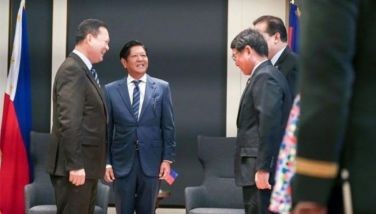30% of Filipinos now use cellphones
May 7, 2004 | 12:00am
The Philippines now has close to 26 million mobile phone subscribers, which means that around 30 percent of Filipinos are now using this technological wonder.
As of March 31, 2004, Smart Communications, a wholly owned subsidiary of the Philippine Long Distance Telephone Co. (PLDT), had the largest share of the market for cellular phone service, with a total subscriber base of 12 million. Ayala-owned Globe Telecom follows with 9.1 million subscribers.
Another PLDT subsidiary, Pilipino Telephone Inc. (under the Talk ‘N Text GSM brand), is a far third with 2.4 million subscribers followed by Globe’s Touch Mobile with 1.55 million subscribers, bringing the total number of subscribers in the country to 25.05 million.
The latest entry into the cellular mobile telephone systems (CMTS) service business, Digital Mobile owned by the Gokongwei group and which uses the brandname Sun Cellular has yet to disclose its latest tally of subscribers. At the end of 2003, officials estimated that their number was anywhere from 600,000 to 800,000 subscribers. One Digital Mobile official estimates that the number is close to one million subscribers.
Including Digital Mobile’s numbers, total subscribers in the Philippines could easily reach 26 million.
There is no indication that the market is about to slow down. PLDT president and CEO Napoleon Nazareno said a 35 to 40 percent penetration rate is not impossible in the next three years. A 35 to 40 percent penetration rate means that such percentage of the population, or 35 or 40 out of 100 Filipinos, are mobile phone subscribers.
Cellular phones have no doubt replaced traditional fixed lines as the choice means of communication. Unlike wireless, the landline business has remained stagnant. Data from the National Telecommunications Commission (NTC) show that the total number of installed landlines in the country stands at 6.63 million of which only 2.86 million lines have been subscribed.
Of the 6.63 million total installed lines, PLDT accounts for the bulk with about 2.6 million, followed by Smart with 866, 954, Globe with 790,291, Digitel 611, 166, Islacom 488,531, Bayantel with 466,493, Piltel with 463,541. The rest of the players are Capwire/PT&T, Eastern Telecom, and Philcom.
Meanwhile, of the total number of subscribed lines, PLDT accounts for 1.7 million, Smart 116, 992, Globe 158, 249, Digitel 344,368, Islacom, 150,440, Bayantel 219,082, and Piltel 56,967.
The increased number of installations despite the obvious lack of takers is largely due to the government’s service area scheme (SAS), which requires CMTS and IGF (international gateway facility) operators to install 400,000 and 300,000 local exchange lines respectively in exchange for their license to operate. A company which operates both CMTS and IGF (like Globe and Smart) will have to put up 700,000 landlines.
However, depressed market conditions brought about by the Asian crisis and the shift to cellular phones lowered demand for landlines. Most of the installations were also concentrated in major urban centers where competition is tough. Some companies like Bayantel even had to borrow money from foreign lenders just to comply with the requirement and are now facing difficulties repaying the loan because its cost has more than doubled. Bayantel borrowed when the exchange rate was only P26 to $1.
Most landline operators are squeezing blood out of their fledging wireline business and have shifted focus to the promising data services to leverage their vast and expensive networks.
PLDT chairman Manuel V. Pangilinan said the company is now focused on enhancing if not maintaining the stability of their fixed line business while at the same time raising revenues and controlling cost for their wireless (cellular) operations.
PLDT’s information and communications technology arm ePLDT during the first quarter of 2004 generated revenues of P442 million and net income of P48 million (compared to a reported loss of P441 million in the same quarter last year). Its call center operations (through Parlance and Vocativ) have also shown promise.
ePLDT president Ray Espinosa said they are now looking at tapping the vast potentials of business process outsourcing (BPO) and expanding their call center business.
As of March 31, 2004, Smart Communications, a wholly owned subsidiary of the Philippine Long Distance Telephone Co. (PLDT), had the largest share of the market for cellular phone service, with a total subscriber base of 12 million. Ayala-owned Globe Telecom follows with 9.1 million subscribers.
Another PLDT subsidiary, Pilipino Telephone Inc. (under the Talk ‘N Text GSM brand), is a far third with 2.4 million subscribers followed by Globe’s Touch Mobile with 1.55 million subscribers, bringing the total number of subscribers in the country to 25.05 million.
The latest entry into the cellular mobile telephone systems (CMTS) service business, Digital Mobile owned by the Gokongwei group and which uses the brandname Sun Cellular has yet to disclose its latest tally of subscribers. At the end of 2003, officials estimated that their number was anywhere from 600,000 to 800,000 subscribers. One Digital Mobile official estimates that the number is close to one million subscribers.
Including Digital Mobile’s numbers, total subscribers in the Philippines could easily reach 26 million.
There is no indication that the market is about to slow down. PLDT president and CEO Napoleon Nazareno said a 35 to 40 percent penetration rate is not impossible in the next three years. A 35 to 40 percent penetration rate means that such percentage of the population, or 35 or 40 out of 100 Filipinos, are mobile phone subscribers.
Cellular phones have no doubt replaced traditional fixed lines as the choice means of communication. Unlike wireless, the landline business has remained stagnant. Data from the National Telecommunications Commission (NTC) show that the total number of installed landlines in the country stands at 6.63 million of which only 2.86 million lines have been subscribed.
Of the 6.63 million total installed lines, PLDT accounts for the bulk with about 2.6 million, followed by Smart with 866, 954, Globe with 790,291, Digitel 611, 166, Islacom 488,531, Bayantel with 466,493, Piltel with 463,541. The rest of the players are Capwire/PT&T, Eastern Telecom, and Philcom.
Meanwhile, of the total number of subscribed lines, PLDT accounts for 1.7 million, Smart 116, 992, Globe 158, 249, Digitel 344,368, Islacom, 150,440, Bayantel 219,082, and Piltel 56,967.
The increased number of installations despite the obvious lack of takers is largely due to the government’s service area scheme (SAS), which requires CMTS and IGF (international gateway facility) operators to install 400,000 and 300,000 local exchange lines respectively in exchange for their license to operate. A company which operates both CMTS and IGF (like Globe and Smart) will have to put up 700,000 landlines.
However, depressed market conditions brought about by the Asian crisis and the shift to cellular phones lowered demand for landlines. Most of the installations were also concentrated in major urban centers where competition is tough. Some companies like Bayantel even had to borrow money from foreign lenders just to comply with the requirement and are now facing difficulties repaying the loan because its cost has more than doubled. Bayantel borrowed when the exchange rate was only P26 to $1.
Most landline operators are squeezing blood out of their fledging wireline business and have shifted focus to the promising data services to leverage their vast and expensive networks.
PLDT chairman Manuel V. Pangilinan said the company is now focused on enhancing if not maintaining the stability of their fixed line business while at the same time raising revenues and controlling cost for their wireless (cellular) operations.
PLDT’s information and communications technology arm ePLDT during the first quarter of 2004 generated revenues of P442 million and net income of P48 million (compared to a reported loss of P441 million in the same quarter last year). Its call center operations (through Parlance and Vocativ) have also shown promise.
ePLDT president Ray Espinosa said they are now looking at tapping the vast potentials of business process outsourcing (BPO) and expanding their call center business.
BrandSpace Articles
<
>
- Latest
- Trending
Trending
Latest




























